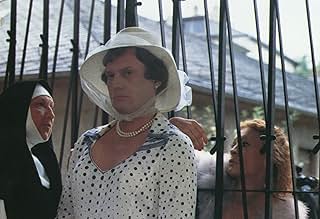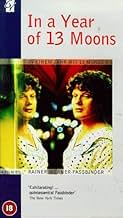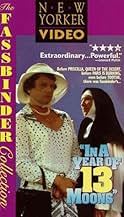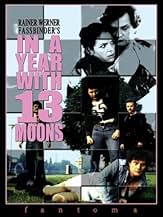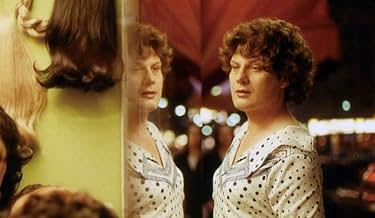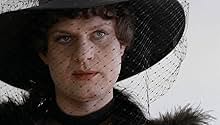IMDb RATING
7.4/10
4.9K
YOUR RATING
A transgender woman tries to salvage something from the wreckage love has made of her life by confronting her anguished past, hoping to find ultimate acceptance among former acquaintances an... Read allA transgender woman tries to salvage something from the wreckage love has made of her life by confronting her anguished past, hoping to find ultimate acceptance among former acquaintances and herself.A transgender woman tries to salvage something from the wreckage love has made of her life by confronting her anguished past, hoping to find ultimate acceptance among former acquaintances and herself.
- Awards
- 1 win
Lilo Pempeit
- Schwester Gudrun
- (as Lieselotte Pempeit)
Janez Bermez
- Oskar Pleitgen
- (uncredited)
Rainer Werner Fassbinder
- Self
- (archive footage)
- (uncredited)
Günther Holzapfel
- Angestellter H. H. Brei
- (uncredited)
Ursula Lillig
- Putzfrau
- (uncredited)
Augusto Pinochet
- Self
- (archive footage)
- (uncredited)
- Director
- Writer
- All cast & crew
- Production, box office & more at IMDbPro
Storyline
Did you know
- TriviaThe tape-recorded narration heard throughout the film (particularly during the final scene) was not scripted. Volker Spengler (playing Elvira Weishaupt) and Rainer Werner Fassbinder recorded the narration together, with Fassbinder asking questions and Spengler responding in character. In the final cut of the film, Fassbinder's voice is edited out.
- SoundtracksSchöner fremder Mann
Music and Words by Athena Hosey and Hal Gordon and German lyrics by Camillo Felgen
Performed by Connie Francis
Featured review
"[...] And Elvira opposes this idea to her that she found in the novel Welt am Draht and which, for the moment, seems very reasonable and relevant to her: the world in which she finds herself is only the model. Of a higher world where reactions are tested by means of seemingly real living beings. " - Rainer Werner Fassbinder, Synopsis of The Year of the Thirteen Moons.
With this cited description, I think its safe to say that Fassbinder perceives and consider the world, as a wretched hell deprived of any order and justice. In the time of making the picture at least.
The film begins by stating that the years with the 13 moons are inextricably linked to personal tragedies, seeming to erode his faith in individual drama as a result of fate and the movements in our stars. Most definetely affected by an emotionally challanging event within his own personal relations. On May 31, 1978, Armin Meier, a young actor and lover of the director, commits suicide by drinking a cocktail of sleeping pills and alcohol, after four years enduring the despotic treatment of Fassbinder and after he write him a letter ending their relationship and offering him a monthly allowance and the apartment they shared in Munich. Six days later, after the discovery of Meier's body by the building's doorman due to the strong stench emanating from the apartment, Fassbinder refuses to attend the funeral of his ex-lover (in view of the general scandal and in his own words,A year with thirteen moons, an exercise of atonement that will lead to the most personal and heartbreaking work of his filmography *.
He almost contemplated leaving filmmaking altogether, however realizing the only way he could get through the suffering and make sense of it all, - was making a film. To explore and his own experience, and conquer his reality. The themes; loneliness, alienation and being a true outsider of this world. He delivers, then, with "The Night with the 13 Moons", one of the most heartbreaking ode to the individual need for acceptance and to the uninterrupted ping-pong between bodies and needs.
It renders so well the heartfelt pain of suffering in life. When everything has gone to hell and a futile try for acceptance becomes fatal. The emotional exhaustion of tearful aggression and anoyance towards the absurd and incomprehensible world. And the fact that this is supposedly what was going on in Fassbinder's life, elevates the film and makes it more profound: this was an artist in despair and trying to find some redemption through his art.
The film isnt directly gratifying in an ordinary cinematical way, - its terrifyingly horrible. And targeted in an confrontational way towards whoever in the audience whom want to accompanie him on this downward spiral death-trip. In that sense it's a boldly experimental film. This is a film that may be most daring in juggling tone. The Year of the Thirteen Moonsis is structured in resemblance to acts or episodes of a biblical story, almost theatrical but manages to hold on to the film medium.
The most brutal and ferocious passage remains the sequence of the slaughterhouse: against a background of Handel, Elvira declaims Goethe while on the screen, we bleed, slice, open and skin cattle. I suppose it would symbolize a thesisical metaphor on suffering, how's it feels: the Hurt.
Fassbinder casts on Erwin / Elvira the traits of his unfortunate lover, Armin Meier, while he unfolds himself into the multiple characters that will cause the protagonist's descent into hell: The unpredictable will /movement of our bodies. Fassbinder have chosen a transgender and sensative martyr to attend this role. In his desperate search for love, the protagonist renounces himself and his own masculinity to find nothing but rejection and loneliness. And Volker Spengler sensitively embodies this jaw-dropping role of a heavy angel, almost antipsychological. Its an interpretation -probably- taken from the soul and freed from all forms of paper and false emotion, Fassbinder finds the ideal incarnation of man in the moment of absolute and self-destructive need for acceptance of the present self. Fassbinder is only partially interested in the story of his main character's suffering. He puts one obstacle after the other in the way of a possible empathy on the part of the viewer. The director watches his protagonist burn without hesitation and intention of interfering.
Volker Spengler plays it as a narcissistic and passive aggressive wreck, who speaks autistically to itself in plaintive singsong and presents itself to its tormentors as a grateful target for attack. Seemingly, on the surface, naive, but one can't help to offer ones symphaty and understandment when you have heard his life story.
Sometimes Fassbinder takes his figure by the hand, accompanies it a little and shows understanding. But then he pushes her away again to watch her despair from a distance.
There comes a time when the people who forsake or hurt Elvira don't do it out of spite but out of indifference. Anton Saitz sums up these contradictions: destroyed by Nazism, he destroys others, manages brothels like concentration camps. Feared and hoped for like the big villain of the film, he turns out to be totally childish, preferring to replay a scene from a Jerry Lewis comedy.
The vexating and tricky problem I have is, however, first of all the familiar theme. Life's suffering isnt exactly a new theme of a film but it is on the other hand universal and eternal. Though the envoirment and the characters are in this type of vulgar and astethical style - unique. The film is also, while an enjoyable film experience, as I said, quite ungratifying and anti-climatic. Which creates a irritational odd ball and thought that the film could be more giving.
With this cited description, I think its safe to say that Fassbinder perceives and consider the world, as a wretched hell deprived of any order and justice. In the time of making the picture at least.
The film begins by stating that the years with the 13 moons are inextricably linked to personal tragedies, seeming to erode his faith in individual drama as a result of fate and the movements in our stars. Most definetely affected by an emotionally challanging event within his own personal relations. On May 31, 1978, Armin Meier, a young actor and lover of the director, commits suicide by drinking a cocktail of sleeping pills and alcohol, after four years enduring the despotic treatment of Fassbinder and after he write him a letter ending their relationship and offering him a monthly allowance and the apartment they shared in Munich. Six days later, after the discovery of Meier's body by the building's doorman due to the strong stench emanating from the apartment, Fassbinder refuses to attend the funeral of his ex-lover (in view of the general scandal and in his own words,A year with thirteen moons, an exercise of atonement that will lead to the most personal and heartbreaking work of his filmography *.
He almost contemplated leaving filmmaking altogether, however realizing the only way he could get through the suffering and make sense of it all, - was making a film. To explore and his own experience, and conquer his reality. The themes; loneliness, alienation and being a true outsider of this world. He delivers, then, with "The Night with the 13 Moons", one of the most heartbreaking ode to the individual need for acceptance and to the uninterrupted ping-pong between bodies and needs.
It renders so well the heartfelt pain of suffering in life. When everything has gone to hell and a futile try for acceptance becomes fatal. The emotional exhaustion of tearful aggression and anoyance towards the absurd and incomprehensible world. And the fact that this is supposedly what was going on in Fassbinder's life, elevates the film and makes it more profound: this was an artist in despair and trying to find some redemption through his art.
The film isnt directly gratifying in an ordinary cinematical way, - its terrifyingly horrible. And targeted in an confrontational way towards whoever in the audience whom want to accompanie him on this downward spiral death-trip. In that sense it's a boldly experimental film. This is a film that may be most daring in juggling tone. The Year of the Thirteen Moonsis is structured in resemblance to acts or episodes of a biblical story, almost theatrical but manages to hold on to the film medium.
The most brutal and ferocious passage remains the sequence of the slaughterhouse: against a background of Handel, Elvira declaims Goethe while on the screen, we bleed, slice, open and skin cattle. I suppose it would symbolize a thesisical metaphor on suffering, how's it feels: the Hurt.
Fassbinder casts on Erwin / Elvira the traits of his unfortunate lover, Armin Meier, while he unfolds himself into the multiple characters that will cause the protagonist's descent into hell: The unpredictable will /movement of our bodies. Fassbinder have chosen a transgender and sensative martyr to attend this role. In his desperate search for love, the protagonist renounces himself and his own masculinity to find nothing but rejection and loneliness. And Volker Spengler sensitively embodies this jaw-dropping role of a heavy angel, almost antipsychological. Its an interpretation -probably- taken from the soul and freed from all forms of paper and false emotion, Fassbinder finds the ideal incarnation of man in the moment of absolute and self-destructive need for acceptance of the present self. Fassbinder is only partially interested in the story of his main character's suffering. He puts one obstacle after the other in the way of a possible empathy on the part of the viewer. The director watches his protagonist burn without hesitation and intention of interfering.
Volker Spengler plays it as a narcissistic and passive aggressive wreck, who speaks autistically to itself in plaintive singsong and presents itself to its tormentors as a grateful target for attack. Seemingly, on the surface, naive, but one can't help to offer ones symphaty and understandment when you have heard his life story.
Sometimes Fassbinder takes his figure by the hand, accompanies it a little and shows understanding. But then he pushes her away again to watch her despair from a distance.
There comes a time when the people who forsake or hurt Elvira don't do it out of spite but out of indifference. Anton Saitz sums up these contradictions: destroyed by Nazism, he destroys others, manages brothels like concentration camps. Feared and hoped for like the big villain of the film, he turns out to be totally childish, preferring to replay a scene from a Jerry Lewis comedy.
The vexating and tricky problem I have is, however, first of all the familiar theme. Life's suffering isnt exactly a new theme of a film but it is on the other hand universal and eternal. Though the envoirment and the characters are in this type of vulgar and astethical style - unique. The film is also, while an enjoyable film experience, as I said, quite ungratifying and anti-climatic. Which creates a irritational odd ball and thought that the film could be more giving.
- XxEthanHuntxX
- Dec 4, 2021
- Permalink
- How long is In a Year with 13 Moons?Powered by Alexa
Details
- Release date
- Country of origin
- Language
- Also known as
- In einem Jahr mit 13 Monden
- Filming locations
- Production companies
- See more company credits at IMDbPro
Box office
- Budget
- DEM 700,000 (estimated)
- Runtime2 hours 4 minutes
- Sound mix
- Aspect ratio
- 1.66 : 1
Contribute to this page
Suggest an edit or add missing content

Top Gap
By what name was In a Year with 13 Moons (1978) officially released in India in English?
Answer
